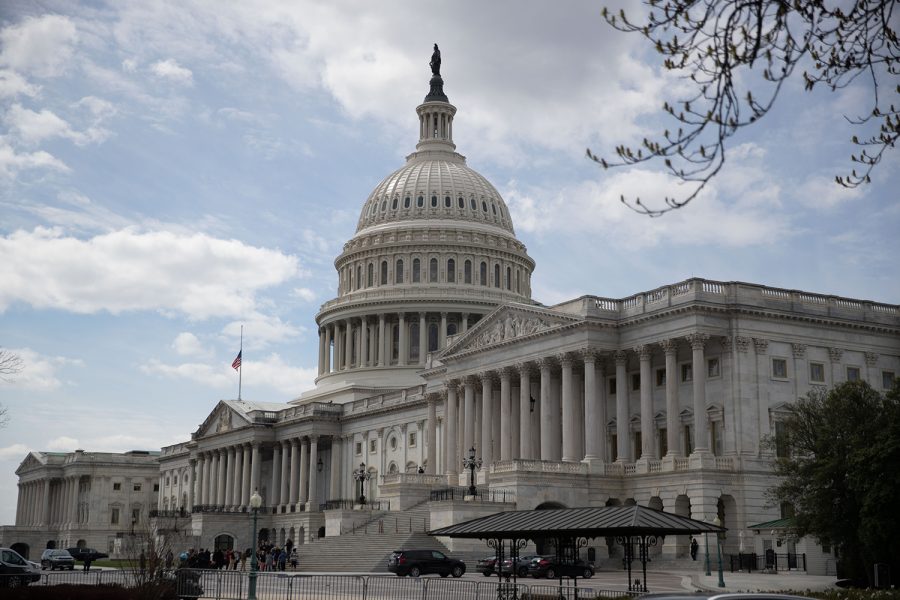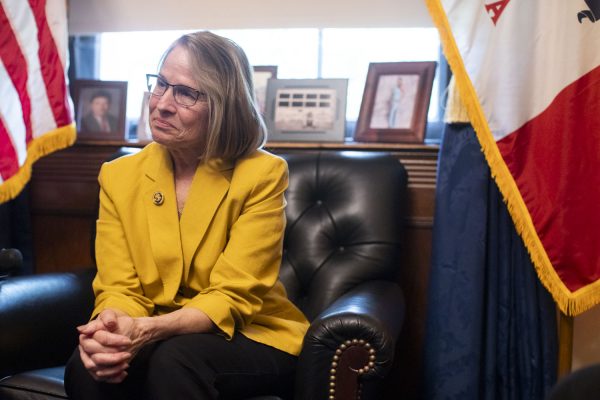Iowa lawmakers drive parental rights debate on national stage
Following the passage of a “parents bill of rights” in the U.S. House, The Daily Iowan talked with Iowa’s Federal delegates about a national push for parental rights legislation.
The U.S. Capitol is seen on Tuesday, March 28, 2023.
March 28, 2023
WASHINGTON — Iowa lawmakers are leading the push for parental rights on a statewide and national level following the passage of the “Parents Bill of Rights Act” last week.
The U.S. House passed House Resolution 5, or the Parents Bill of Rights Act, 213-208 on party lines, on Friday. The act was originally pioneered by Rep. Ashley Hinson, a Republican who represents northeast Iowa.
The Daily Iowan talked with Iowa federal delegates, including Hinson and U.S. Rep. Mariannette Miller-Meeks. Both legislators voted for the bill and have been strong supporters of the parental rights movement.
All Democratic and five Republican lawmakers voted against the measure, and it is unlikely to be taken up by the Democratically-controlled Senate.
Lawmakers expressed concerns about the state possibly limiting parental rights and the federal government investigating parents for attending school board meetings.
Lawmakers allege U.S. Department of Justice, FBI investigated parents for attending school board meetings
Lawmakers on the U.S. House Judiciary Committee have alleged that the FBI and the Department of Justice issued a politically-driven memo in 2021. The memo directed the FBI to work with local law enforcement to address intimidation and harassment of school board members.
School board officials from the Iowa City, Linn-Mar, and Cedar Rapids school districts told the Cedar Rapids Gazette in May that meetings have become more divisive.
Democrats on the committee said the report by Republican Ohio Republican Rep. Jim Jordan focused on a narrow part of the investigation by the committee.
U.S. Attorney General Merrick Garland said the threats to school board members were dangerous and stemmed from the district’s COVID-19 policies and rhetoric surrounding curriculum after the COVID-19 pandemic.
“Threats against public servants are not only illegal, they run counter to our nation’s core values,” Garland wrote. “Those who dedicate their time and energy to ensuring that our children receive a proper education in a safe environment deserve to be able to do their work without fear for their safety.”
Miller-Meeks, a Republican who represents southeast Iowa, said the directive threatened parents’ free speech and freedom of association.
“We think that those things are a violation of the Constitution and felt that it was necessary to reinforce the fact that parents — number one — are the primary educators of their children and — number two — they have a right to have a voice in their children’s education,” Miller-Meeks said.
Hinson said the bill’s main goal was to solidify parents’ rights regarding their education and send a message to the DOJ that parents are the best stewards of their child’s education.
“When we’ve seen some aggressive actions from this administration, the Department of Justice, it was a good time for us to lay down a marker about making sure we are being very clear about parents’ rights when it comes to their kids’ education,” Hinson said. “I think that’s really important and making sure that they are not being targeted as domestic terrorists for speaking their mind.”
U.S. Sen. Chuck Grassley, R-Iowa, said he was also concerned by the Justice Department’s decision to investigate parents for voicing their opposition to school board policies.
“I think you have a right under the Constitution to petition the government for a redress of grievances, freedom of association, free speech, to go to school board meetings and express your views,” Grassley said in an interview with the DI on Monday. “And when you do this, all these things have to be done in a peaceful way. But I think it’s very much a depressing, chilling effect, what the attorney general has done.”
Reinforcing parental rights to view and challenge curriculum in schools
The Parents Bill of Rights Act passed through the House on Friday. It would enumerate a set of information that would be required to be quickly communicated to parents and available on the school website.
Miller-Meeks said she wanted to reinforce that parents have a right to view the curriculum, know what books their children have access to, and meet with their student’s teachers.
“It is a right of a parent to be able to request to meet with their child’s educator and that attending a school board meeting shouldn’t label people as domestic terrorists and that they’re not going to be tracked or approached by the FBI or the Department of Justice,” Miller-Meeks said. “They know that’s a right that exists, and they can exercise their right to free speech.”
Hinson said the bill strengthened the communication between schools and parents and requires schools to involve parents in all steps of the education process from the school’s budget to what children learn.
“We wanted to lay down the baseline of some basic policy to make sure it’s very clear where we stand,” Hinson said. “Because that is an issue that I continue to hear about from parents in the district at home.”















